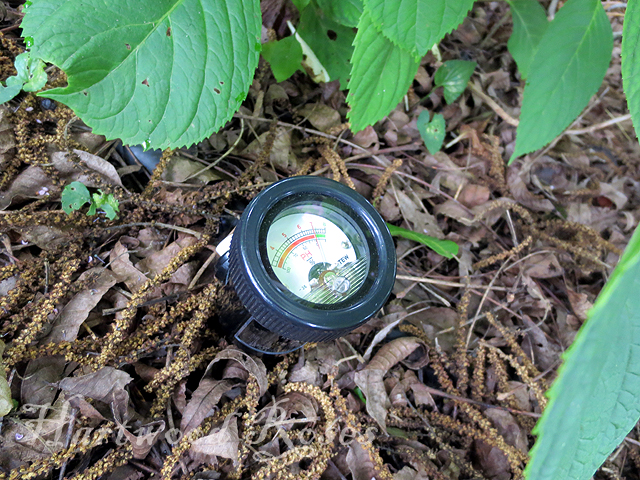(public domain stock photo)
In my yard, the plant looks like this:
Not so much as a hint of blue to be found anywhere.
Soil in our part of Virginia is generally acidic heavy clay that requires profuse amounts of organic soil amendments and annual application of lime to get it to a point where plants will thrive. The soil on our property, though, is a gardener's dream. Our pH here ranges from 6.2 in my new rose bed to 7.0 underneath this hydrangea beside the pavilion. (Compare this to the gardens at my last house where unimproved soil pH was a miserable 5.5 or lower.)
Stick the pH meter into the ground ... wait a couple of minutes ...
Ta dahhh! 7.0 (Kelway pH meter)
Is this because our place has been a working farm since the 1830s? I tend to think so, because I can dig a hole just about anywhere and I have to go down about a foot or more before I hit clay. Decades and decades of plowing and manure have done their work, and I don't usually have to amend the soil one bit when I plant.
I've never had pink hydrangeas before, and I really love having these! (Now that I think of it, maybe the pH is higher in this spot because of the abandoned brick-lined septic tank that we covered up with we built the pavilion ... decades of families and lots of you-know-what.)
Anyway .... it's a good thing that my plan in the shade garden doesn't depend on these hydrangeas being one certain color ... in fact, they are the ONLY color in this garden. All of the other flowers are white, and the foliage plants provide varying shades of green and different sizes and textures of leaves. Hostas, Hellebores, three more varieties of Hydrangea (Annabelle, Tardiva, and Lace Cap), Solomon's Seal, etc ... very lush, cool, and peaceful.
This cool feeling is a good thing, since summer heat has arrived. That's okay ... it is almost July, after all.

















